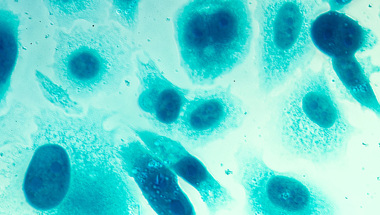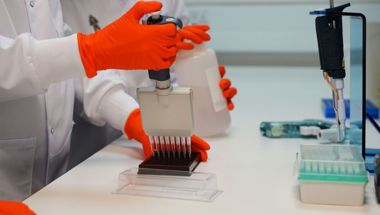
Can this ovarian cancer treatment help men with advanced prostate cancer?

Grant information
Reference: RIA24-ST2-003
Lead researcher: Dr Toby Phesse
Institution: Cardiff University
Award: £468,325
What you need to know
- A new drug has shown promise in shrinking ovarian cancer and might help treat advanced prostate cancer too.
- This project will test how well the drug works in prostate cancer, and why it seems to avoid common side effects in the bowel and bone.
- Researchers will also explore how prostate cancer cells interact with bone, to find new ways to stop the disease from spreading.
Why are we funding this research?
Advanced prostate cancer is difficult to treat, especially once it spreads to other parts of the body like the bones. Current treatments can help for a while, but they often stop working and come with tough side effects. That leaves men with fewer options and a lot of uncertainty.
This research is trying to change that. It’s testing a new drug called FZD7-ADC, which has already been shown to shrink ovarian cancer without causing damage to the bowel or bone – something most cancer drugs struggle with.
What makes this project different is that it’s not just testing the drug - it’s also digging into how prostate cancer cells behave when they reach the bone. That’s a big unknown in the field. By understanding how these cells grow and spread, the researchers hope to uncover new ways to stop the disease in its tracks.
What will the researchers do?
To find out if the new drug could help treat advanced prostate cancer, the researchers will run a series of lab experiments using specially bred mice and human cancer cells. These mice are designed to mimic how prostate cancer behaves in men, especially when it spreads to the bone. The team will give the mice the new drug, FZD7-ADC, and monitor whether it can shrink tumours and stop cancer cells from spreading.
They’ll also look closely at how the drug affects healthy cells, particularly in the bowel and bone, since many cancer drugs cause damage there. To do this, they’ll use advanced imaging and lab-grown 'mini-guts' made from human tissue to see how cells respond to the treatment. If the bowel cells can recover after treatment, that’s a good sign the drug might be safer than current options.
Another part of the project will explore how prostate cancer cells interact with bone cells. The researchers believe that certain signals between these cells might help the cancer grow and spread. By studying these signals, they hope to uncover new weak spots in the cancer that future drugs could target.
Altogether, this work will show whether FZD7-ADC is a promising new treatment, and help build the case for testing it in men through clinical trials.
We’re thrilled to receive funding from Prostate Cancer UK to test a promising new drug for advanced prostate cancer. It targets a pathway that’s been challenging to treat until now, and could reduce side effects. This project brings together lab research, clinical expertise and patient voices to drive real progress for men.
How will this benefit men?
This research could lead to better treatments with fewer side effects, making a real difference for men living with advanced prostate cancer.
The new drug being tested, FZD7-ADC, is designed to target cancer cells more precisely, and early results suggest it might avoid the usual damage to healthy tissues like the bowel and bone. If it works in prostate cancer as it has in ovarian cancer, it could lead to a treatment that’s both more effective and easier for men to cope with.
Beyond the drug itself, the research will also help us understand how prostate cancer spreads to the bone - a major problem in advanced prostate cancer. That knowledge could open the door to even more targeted treatments in future.





